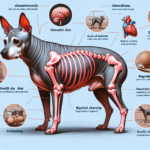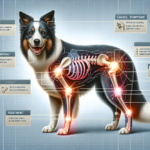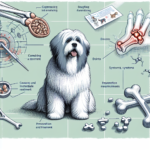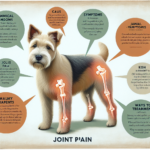Pembroke Welsh Corgi Joint Pain: Causes, Symptoms, Prevention, and Treatment
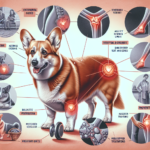
Introduction
The Pembroke Welsh Corgi, often simply referred to as the Corgi, is a small herding dog breed that originated in Pembrokeshire, Wales. Known for their short legs, long bodies, and large ears, Corgis are beloved for their playful and affectionate nature. Historically, they were used as herding dogs, a role that required agility and stamina. Today, they are popular family pets and are known for their intelligence and loyalty.
Like many purebred dogs, Pembroke Welsh Corgis are prone to certain health issues. Among these, joint pain is a significant concern. Joint health is crucial for Corgis due to their unique body structure and active lifestyle. Understanding the causes, symptoms, prevention, and treatment of joint pain in Pembroke Welsh Corgis can help owners ensure their pets lead healthy, comfortable lives.
Breed-Specific Joint Pain Risks
Genetic Predisposition
Pembroke Welsh Corgis are genetically predisposed to several joint-related issues. Hip dysplasia, a condition where the hip joint doesn’t fit properly into the hip socket, is relatively common in this breed. Elbow dysplasia, where the elbow joint is malformed, can also occur. Additionally, Corgis are prone to developing arthritis, a degenerative joint disease that causes pain and stiffness.
Age-Related Risks
As Pembroke Welsh Corgis age, the risk of joint pain increases. While young Corgis may show few signs of joint issues, older dogs often develop arthritis or other degenerative joint conditions. Owners should be particularly vigilant as their Corgi approaches middle age, typically around 5-7 years old, as this is when joint problems often begin to manifest.
Activity Level and Joint Stress
Pembroke Welsh Corgis are active dogs that enjoy running, playing, and herding. While regular exercise is essential for their overall health, excessive or high-impact activities can put stress on their joints. Activities like jumping or running on hard surfaces can exacerbate joint issues, especially in dogs that are already predisposed to such problems.
Common Symptoms of Joint Pain in Pembroke Welsh Corgis
General Symptoms
- Limping or favoring one leg
- Stiffness, especially after resting
- Reluctance to move, jump, or climb stairs
- Decreased activity or playfulness
- Visible discomfort or pain when touched
- Swelling around the joints
Breed-Specific Symptoms
In Pembroke Welsh Corgis, joint pain may also manifest as a reluctance to perform activities they once enjoyed, such as herding or playing fetch. Due to their body structure, they may also exhibit a noticeable sway or wobble in their gait when experiencing joint pain.
When to Consult a Vet
If your Corgi shows any signs of joint pain, it’s essential to consult a veterinarian promptly. Early intervention can help manage symptoms and slow the progression of joint diseases. Persistent limping, noticeable pain, or any sudden changes in behavior should be addressed by a professional.
Preventive Measures for Joint Health
Exercise Recommendations
Regular, moderate exercise is crucial for maintaining joint health in Pembroke Welsh Corgis. Activities like walking, swimming, and gentle play are ideal. Avoid high-impact exercises like jumping or running on hard surfaces. Instead, focus on low-impact activities that keep your Corgi active without putting undue stress on their joints.
Dietary Suggestions
A balanced diet rich in essential nutrients can support joint health. Look for dog foods that contain glucosamine and chondroitin, which help maintain cartilage health. Omega-3 fatty acids, found in fish oil supplements, can also reduce inflammation and support joint function. Always consult your veterinarian before adding supplements to your dog’s diet.
Weight Management
Maintaining a healthy weight is critical for reducing joint stress in Pembroke Welsh Corgis. Excess weight puts additional pressure on the joints, exacerbating pain and increasing the risk of arthritis. Follow your veterinarian’s guidelines for a healthy weight range and adjust your dog’s diet and exercise routine accordingly.
Early Screening and Monitoring
Regular veterinary check-ups are essential for early detection of joint issues. Your vet may recommend screening tests, such as X-rays or joint fluid analysis, to identify problems before they become severe. Monitoring your Corgi’s activity levels and behavior can also help catch joint issues early.
Treatment Options for Joint Pain
Non-Surgical Treatments
Non-surgical treatments for joint pain in Pembroke Welsh Corgis include medications, physical therapy, and lifestyle adjustments. Anti-inflammatory drugs and pain relievers can help manage symptoms. Physical therapy, including exercises and massage, can improve joint function and reduce pain. Lifestyle adjustments, such as providing a comfortable bed and avoiding high-impact activities, can also make a significant difference.
Surgical Options
In severe cases, surgical intervention may be necessary. Common surgeries for joint pain include hip replacement, arthroscopy (a minimally invasive procedure to remove damaged tissue), and joint fusion. Your veterinarian will discuss the best surgical options based on your Corgi’s specific condition and overall health.
Alternative Therapies
Alternative treatments like acupuncture, hydrotherapy, and massage can also benefit Pembroke Welsh Corgis with joint pain. Acupuncture can help reduce pain and inflammation, while hydrotherapy (water-based exercise) provides low-impact exercise that supports joint health. Regular massage can improve circulation and reduce muscle tension around the joints.
Lifestyle and Management Tips
Daily Care Routine
A consistent daily care routine can help manage joint pain in Pembroke Welsh Corgis. Start with a gentle morning walk to loosen stiff joints, followed by a balanced meal with joint-supporting supplements. Incorporate low-impact playtime and regular rest periods throughout the day. End the day with another gentle walk and a comfortable, supportive bed for a good night’s sleep.
Modifying the Home Environment
Making your home more comfortable for a Corgi with joint pain can significantly improve their quality of life. Consider adding ramps to help them navigate stairs or get onto furniture. Provide an orthopedic bed to support their joints while they rest. Ensure their living space is free of slippery surfaces that could cause falls or injuries.
Long-Term Management
Long-term management of joint pain involves regular veterinary check-ups, consistent exercise, a balanced diet, and weight management. Keep track of your Corgi’s symptoms and adjust their care routine as needed. With proper management, many Corgis can lead active, happy lives despite joint pain.
FAQs About Pembroke Welsh Corgis and Joint Pain
What are the early signs of joint pain in Pembroke Welsh Corgis?
Early signs of joint pain include limping, stiffness, reluctance to move, and decreased activity levels. If you notice any of these symptoms, consult your veterinarian for a thorough evaluation.
Can joint pain in Corgis be prevented?
While genetic predispositions cannot be entirely prevented, maintaining a healthy weight, providing regular low-impact exercise, and feeding a balanced diet with joint-supporting supplements can help reduce the risk of joint pain.
Are there specific exercises that are better for Corgis with joint pain?
Yes, low-impact exercises like walking, swimming, and gentle play are ideal for Corgis with joint pain. Avoid high-impact activities like jumping or running on hard surfaces.
What dietary supplements can help with joint health in Corgis?
Supplements containing glucosamine, chondroitin, and omega-3 fatty acids can support joint health. Always consult your veterinarian before adding supplements to your dog’s diet.
When should I consider surgery for my Corgi’s joint pain?
Surgery is typically considered when non-surgical treatments are no longer effective, and the dog’s quality of life is significantly impacted. Your veterinarian will discuss the best surgical options based on your Corgi’s specific condition.
Conclusion
Joint pain is a common issue in Pembroke Welsh Corgis, but with proper care and management, it can be effectively managed. Understanding the causes, symptoms, prevention, and treatment options is crucial for ensuring your Corgi’s joint health. Regular veterinary check-ups, a balanced diet, appropriate exercise, and weight management are key components of maintaining joint health. By taking proactive measures and consulting your veterinarian regularly, you can help your Corgi lead a happy, active life despite joint pain.

